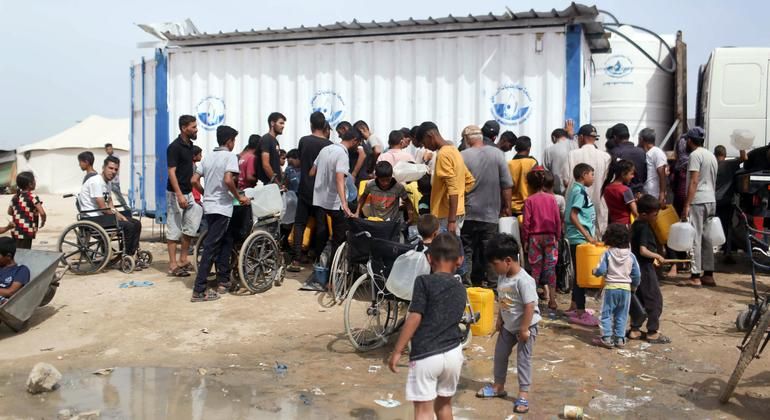The current situation has reached an “unprecedented level of emergency,” he said, and Israel's latest evacuation orders have forced the displacement of tens of thousands of people.
As part of the contingency effort, WHO and its partners have been establishing field hospitals and supporting the restoration of the Nasser Medical Complex in Khan Younis, which will be used as a main referral hospital and with the aim of restoring basic health services.
“We have set up a large warehouse in Deir Al Balah and moved most of the supplies to ensure quick access and movement of supplies to Khan Younis, the middle area and northern Gaza,” he added.
Hospitals are already 'overloaded'
There are currently three hospitals operating in Rafah, including the Emirates Maternity Hospital, and over the past few weeks WHO has ensured that they are fully prepared and supported in terms of medical supplies.
Dr Dahir said hospitals are already “overloaded with patients” and recent events have affected access. He cited the example of Al-Najjar Hospital, which offers dialysis services to more than 100 patients.
“Unfortunately, the hospital is among the blocks ordered evacuated by the Israeli government, so patients are afraid to seek services,” he said.
“We also heard that there are many patients admitted to this hospital who are starting to move out of the hospital.”
He stressed that the WHO has always advocated for hospitals to be protected.
“We have established clear mechanisms for a referral route between hospitals and, in case those hospitals cannot be accessed, what are the other alternatives? And that is why we have been supporting the restoration of the Nasser Medical Complex in Khan Younis.”
When asked about the situation of pregnant women and newborns, Dr. Dahir noted that the Emirates Maternity Hospital is one of the key facilities of its kind in all of Gaza, delivering more than 100 babies every month.
“We have ensured that the hospital is fully occupied. And in case we lose accessibility, we will be able to refer pregnant mothers, for example, to field hospitals in the Al Mawasi area, as well as to the Nasser Medical Complex,” he said.
fuel runs out
Meanwhile, critical fuel for humanitarian operations in Gaza could run out “tomorrow” and some food stocks could last only until the end of the week, a senior UN aid official in the region said on Tuesday.
Andrea de Domenico, head of the UN humanitarian affairs office, OCHA, in the occupied Palestinian territories, said the closure of the Rafah crossing with Egypt has cut off access to fuel, affecting the entry of critical relief items and restricting the humanitarian workers movement.
Speaking from Jerusalem, Mr de Domenico said the lack of fuel is a particular concern as aid workers have only around 30,000 liters of diesel available when they normally use 200,000 liters per day.
Health, water and communications are being prioritized, and some fuel is reserved as a contingency for the safe movement of personnel.
“That will leave us practically without fuel starting tomorrow,” he said.
“The Israelis have said they are looking for a way to bring in more fuel and hope to organize it tomorrow. We will see”he added, noting that distribution will also be a challenge “if Rafah gets caught in the middle of the military operation.”
Communication networks affected
De Domenico explained that communication companies cannot receive the daily amounts of fuel necessary to maintain their networks.
“This means that within a couple of days people will not have access to information, we will not be able to collect information so that people understand their needs and Families will not be able to connect during displacement if they are separated..”
He recalled that more than 75 percent of Gaza's population has been displaced and “may now have no choice but to remain on a shrinking land area.”
lack of shelter
People are moving to places that do not have latrines, water points, adequate drainage or shelter.
“It is impossible to improve the situation at existing and new displacement sites without the influx of supplies and without the fuel to transport them to the places where people are concentrated,” he said.
Meanwhile, Only around 1,500 tents are available to humanitarian partners working in the shelter sector.. He said the lack of tents, combined with the high percentage of damaged or destroyed homes in Gaza, means displaced people leaving Rafah are forced to seek other shelter options.
“They need shelter materials like tarps, ropes, plastic shelters, nails, and those tools are simply not available in Gaza. And without the humanitarian assistance that will bring them, we will not be able to support them.”
Food reserves decrease
Additionally, most food distributions in the south have been suspended since Monday, as many warehouses are located in the part of Rafah affected by hostilities. Furthermore, he estimated that most aid partners could run out of food to help people south of Wadi Gaza by the end of the week.
Aid workers are also running out of fuel to ship the remaining goods. for distribution to homes and 16 bakeries supported by the World Food Program (WFP).
The beleaguered health sector will also be affected if military operations continue, as the three remaining hospitals in Rafah will be left inoperable, depriving 1.2 million people of care.
Water and waste management.
De Dominco also warned that “without fuel tomorrow, the main water production will be closed in the north, depriving the entire population of access to drinking water.”
The same will be applied in the coming days in the southern and central governorates, affecting 1.9 million people.
There is also the “big problem” of solid waste collection, which also depends on fuel supply, and collection points in the south have already been reduced.
“We estimate that there will be a production of 1,400 tons of waste per day that will accumulate on the streets everywhere. And this was already a big challenge because we also still do not have access to the landfill where we could deliver and throw away all the garbage,” he said.
He added that the sewage pumping station in eastern Rafah has already stopped working due to the military operation, which affected 80,000 people.
Concern for unaccompanied children
UN agencies on Tuesday highlighted the plight of women and girls, as well as boys, with De Domenico also focusing on the issue of unaccompanied and separated minors.
He said their numbers “will increase rapidly while our ability to provide them with basic support will be significantly reduced if the situation in Rafah evolves with new military operations.”












